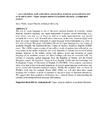| dc.contributor.creator | O'Keeffe, Anne | |
| dc.contributor.creator | McCarthy, Michael | |
| dc.contributor.creator | Walsh, Steve | |
| dc.date.accessioned | 2013-02-28T14:49:59Z | |
| dc.date.available | 2013-02-28T14:49:59Z | |
| dc.date.issued | 2008 | |
| dc.identifier.citation | Walsh, S., O'Keeffe, A., & McCarthy, M. (2008) “ ‘…post-colonialism, multi-culturalism, structuralism, feminism, post-modernism and so on so forth’ – vague language in academic discourse, a comparative analysis of form, function and context”. In: R. Reppen and A. Ädel (Eds), Corpora and Discourse (SCL31). Amsterdam: John Benjamins, pp. 9-29. | en |
| dc.identifier.uri | http://hdl.handle.net/10395/1718 | |
| dc.description.abstract | The use of vague language is one of the most common features of everyday spoken English. Speakers regularly use vague expressions to project shared knowledge (e.g., pens, books, and that sort of thing) as well as to make approximations (e.g. around sevenish, he’s sort of tall). Research shows that many of the most common single word items in a core vocabulary form part of vague language fixed expressions (e.g. thing in that kind of thing). This paper will address the use of vague language in a new corpus of academic English, the Limerick-Belfast Corpus of Spoken Academic English (LIBEL case). The LIBEL corpus consists of one million words of spoken data collected in two universities on the island of Ireland, one in the Republic of Ireland and one in Northern Ireland. Analysis of the LIBEL corpus will identify forms and functions of vague language in an academic context and these findings will then be compared with two corpora of everyday spoken language from the Republic of Ireland and the United Kingdom, namely the Limerick Corpus of Irish English (LCIE) and the Cambridge and Nottingham Corpus of Discourse in English (CANCODE). Cross-corpora comparison allow us to look at how forms and frequencies of certain vague language expressions vary across casual and formal/institutional contexts. Within the academic data we build on Walsh’s work (see for example Walsh 2002, 2006), we will also show how vague language use is relative to mode of discourse at any given stage of classroom interaction. We suggest that these qualitative differences are a valuable means of understanding the complex relationship between language and learning. | en |
| dc.language.iso | eng | en |
| dc.publisher | John Benjamins | en |
| dc.relation.ispartofseries | Corpora and Discourse; | |
| dc.rights | Used with permission from the publishers. Copyright © Amsterdam: John Benjamins. The full title can be found at www.benjamins.com | en |
| dc.subject | English | en |
| dc.subject | Language | en |
| dc.subject | Linguistics | en |
| dc.subject | Corpora | en |
| dc.subject | Discourse | en |
| dc.title | Post-colonialism, multi-culturalism, structuralism, feminism, post-modernism and so on so forth’ – vague language in academic discourse, a comparative analysis of form, function and context (Pre-published version) | en |
| dc.type | Part/ Chapter of book | en |
| dc.type.supercollection | all_mic_research | en |
| dc.type.supercollection | mic_published_reviewed | en |
| dc.type.restriction | none | en |
| dc.type.restriction | none | en |
| dc.type.restriction | none | en |
| dc.description.version | Yes | en |


